Виктор Пинчук стартовал трехлетнюю историческую инициативу под названием «брейн-шторм». В украинском сегменте социальных сетей наблюдается новая волна обсуждений, однако на этот раз она не связана с военно-политическими событиями. В центре внимания оказался анонсированный проект «Украинская история: глобальная инициатива».
Эта попытка переосмысления истории Украины с давних периодов до российско-украинской войны и проведения параллелей с тенденциями в мировой истории с самого начала спровоцировала лавину критики через ее спонсора – олигарха Виктора Пинчука.
Участие в проекте ряда очень авторитетных ученых не загладило ситуацию. Напротив – этих уважаемых людей обвинили в том, что они своим участием благословили пиар одиозного бизнесмена. А состав участников Украинской истории достаточно мощный. В Совет директоров и Международный академический консультативный совет вошли такие персоны, как лауреат Пулитцеровской премии, историкиня Энн Эплбаум, председатель Института национальной памяти Украины Антон Дробович, президент Украинского католического университета митрополит Борис Гудяк, директор Украинского научного университета исторических исследований Львовского национального университета им. Франко Ярослав Грицак, журналистки Юлия Мостовая и Наталья Гуменюк, поэт и новеллист Сергей Жадан, ведущий CNN Фарид Закария, профессор Еврейского университета в Иерусалиме Ювал Харари и другие украинские и зарубежные исследователи.
В процессе написания исторического исследования, рассчитанного на три года, примут участие 90 украинских и зарубежных ученых. Они будут разрабатывать около 70 тем, исследуя при этом их взаимозависимость. В конце каждого ученого должен подать три текста на свою тему: один – научный объемом примерно в 30 тыс. слов, один упрощенный объемом примерно 3 тыс. слов и еще один почти в формате выжимки объемом примерно в тысячу слов. Все тексты должны быть написаны для понимания их общей аудиторией. Как рассказали «Главкому» в пресс-службе проекта, подтвердили в нем свое участие уже около 60% будущих авторов, с остальными назначены собеседования в течение декабря.
Проектом руководят уже упомянутые Совет директоров и Международный академический консультативный совет. Их главами будут давние знакомые Пинчука, ранее замеченные на организуемых им мероприятиях – эксглава МИД, бывший премьер Швеции Карл Бильдт и профессор Йельского университета Тимоти Снайдер соответственно. Сам Пинчук вошел в состав Совета директоров, где скромно отмечен как «основатель, автор идеи проекта, украинский меценат и бизнесмен».
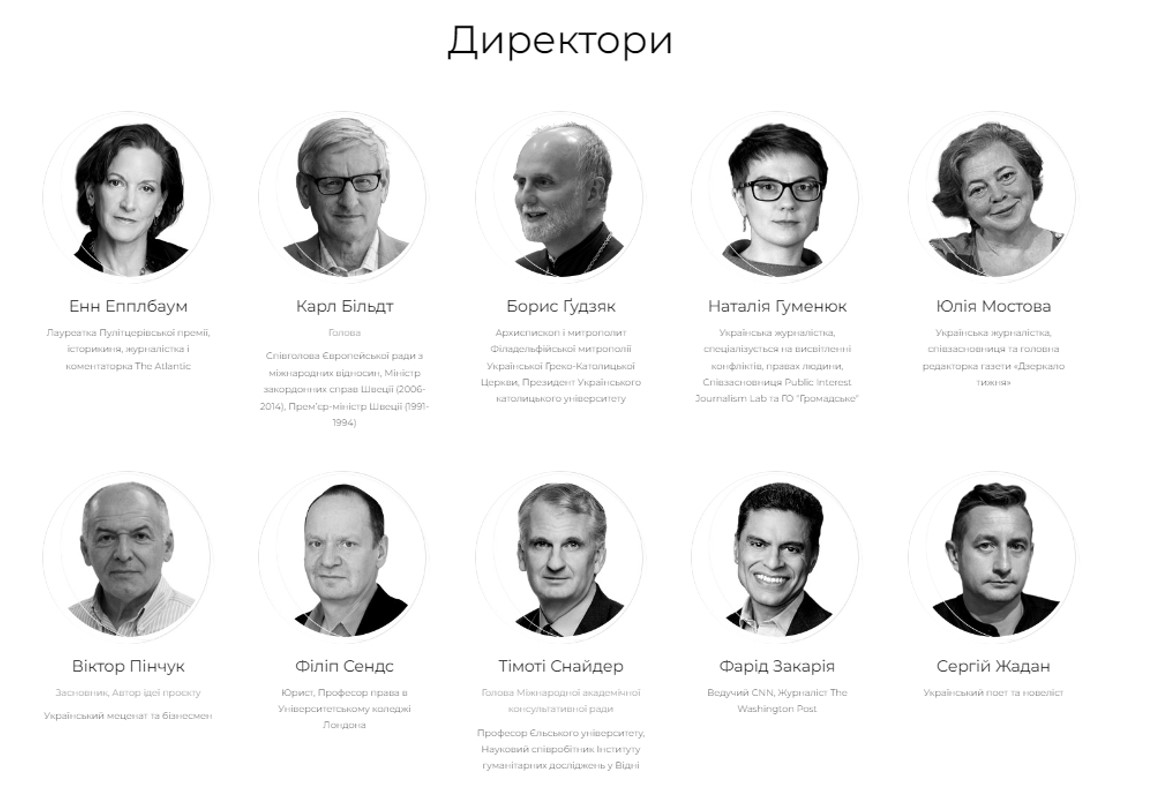
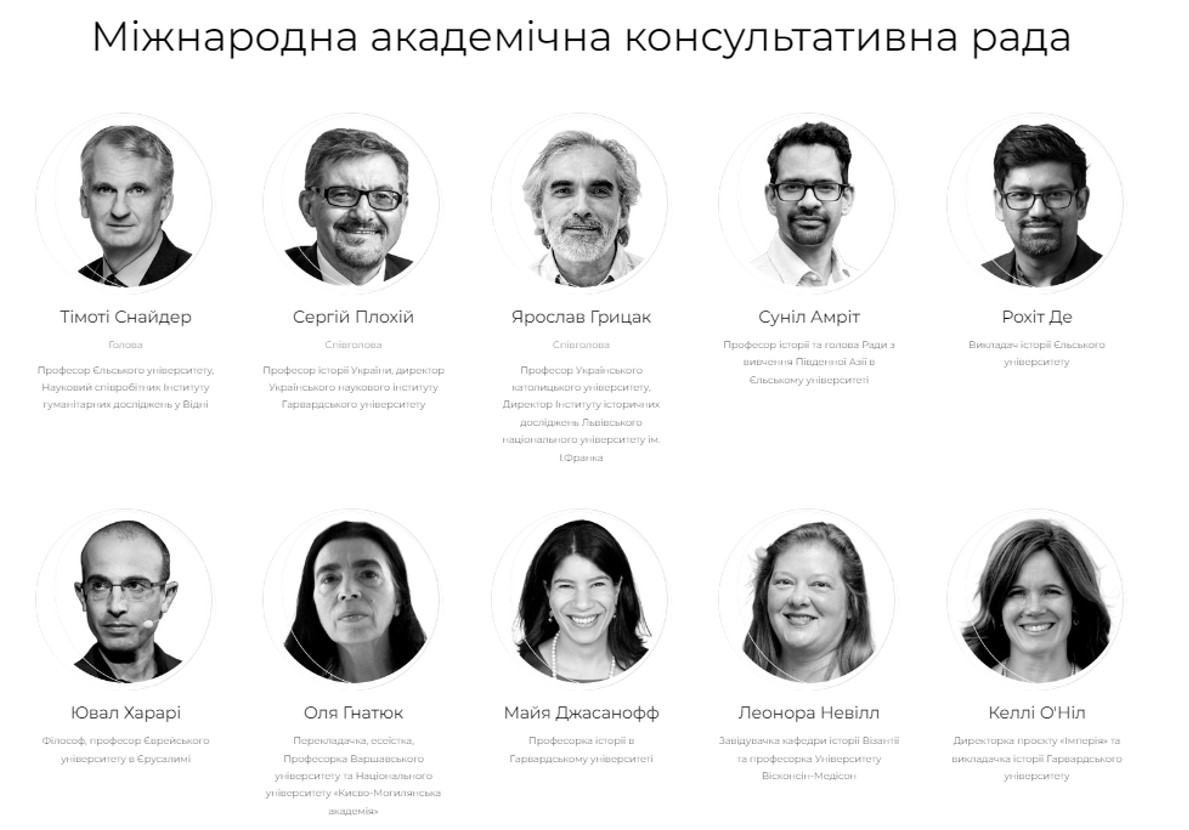
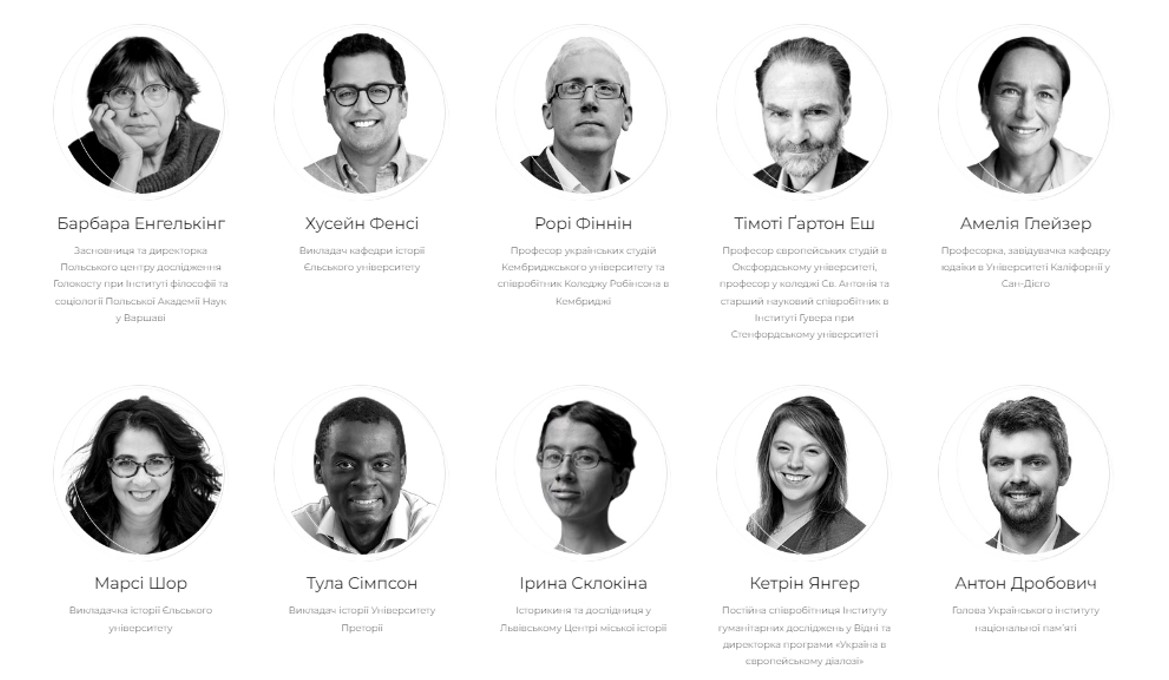
На презентации исследования в Лондоне Пинчук, а он утверждает, что задумал масштабный проект коллективного исследования истории Украины еще в 2019 году, рассказывал, что такое высокое представительство обеспечит самые высокие стандарты научного процесса. А результатом работы ученых станет предоставление множества опровержений российских искажений истории. «Эта работа будет особенно мощной потому, что она будет создана в атмосфере свободы, обмена мнениями, критических обсуждений», – описал ожидания от этого трехлетнего «брейн-шторма» Пинчук.
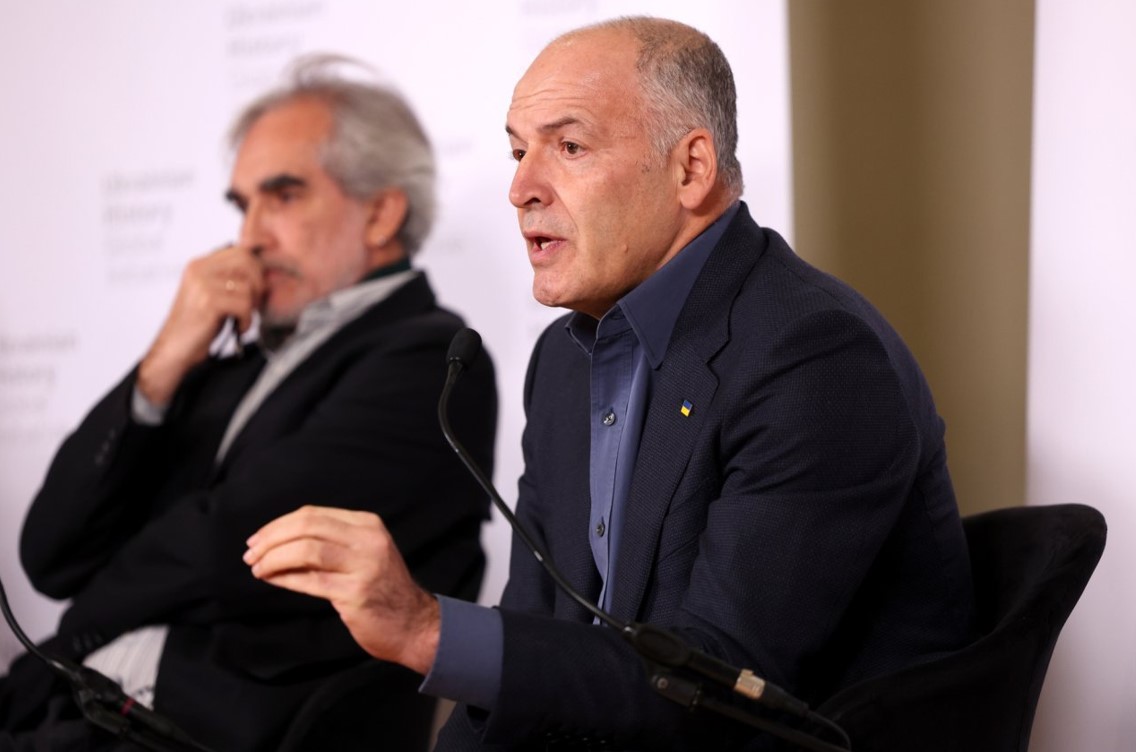
«Фундатор» и «Фальсификаторы»
Но появление новости о таком масштабном проекте спровоцировало обсуждение не столько сущности амбициозной инициативы, сколько, по сути, фигуры ее инициатора. Пинчук до сих пор не может забыть ни его родственные связи с бывшим президентом Леонидом Кучмой, ни попытки сблизиться с командой Виктора Януковича, ни любовь к российским менеджерам и политтехнологам, ни в целом конъюнктурность и привычку вести бизнес под крышей власти. Так, эксдиректор Института национальной памяти нардеп от «Европейской солидарности» Владимир Вятрович обвинил Пинчука, взявшегося за исследование украинской истории, в ее недавнем творении, причем совсем не в положительном ключе. «Пинчук уже творил историю Украины – через контролируемые им медиа и политики, – напоминает Вятрович. – И от этого она в течение четверти века становилась совсем не глобальной, а малороссийской. Поэтому есть основания сомневаться, что по его инициативе написание украинской истории выйдет нечто другое».
Напомнил Вятрович и об еще одной неоднозначной инициативе бизнесмена – совместном с ныне подсанкционными российскими бизнесменами Михаилом Фридманом и Германом Ханом проекте «Бабий яр», которым до последнего времени занимался российский режиссер и продюсер Илья Хржановский с его скандальными экспериментами.
Можно вспомнить также казус, когда олигарх пытался внести свой вклад в историю, который тоже завершился скандалом. В 2016 году он написал статью для The Wall Street Journal, в которой предлагал Украине пойти на болезненные компромиссы с Россией – отказаться от будущего в НАТО и Евросоюзе и фактически забыть о Крыме и оккупированных территориях Донбасса. После поднявшейся шума Пинчук оправдывался и рассказывал, что редакционная версия текста вроде бы отличается от оригинальной.
Острая на язык «свободовка» Ирина Фарион с ее собственными радикальными взглядами на историю и культуру также не могла оставить без своего язвительного комментария такое незаурядное событие: «Мы уже давно написали правдивую украинскую историю – только толки (то же, что и дураки, глупые, – «Главком») ее до сих пор не прочитали, а Минобразования ее отменило. Словом, собрание ликвидаторов националистического исторического дискурса и вводители тоталитарного либерализма. Осторожно! Новые фальсификаторы истории. Каждый историк – это, прежде всего, мировоззрение, а уже потом фактаж и субъективная интерпретация».
Жестко прошелся по историческим изысканиям Пинчука главный редактор портала «Историческая правда» Вахтанг Кипиани. Он, как и Фарион, подверг сомнению компетентность приглашенных ученых. Журналист сравнил этот пул с «Новым ковчегом», отметив, что большинство этих исследователей не имеют никакого отношения к Украине, не знают никаких источников, на основании которых можно писать историю и даже не владеют украинским языком, чтобы прочитать существующие публикации.
«Ну и то, что эту историю и этот пул недешевых экспертов будет финансировать «филантроп» Пинчук – пахнет не фиалками, – саркастически резюмирует Кипиани. – Он один из основателей олигархического пророссийского режима, во время которого были убиты десятки журналистов – в частности, Георгия Гонгадзе, политиков, предпринимателей, а страна была распределена между несколькими десятками «семейств». Совсем недавно именно Пинчук со своими зарубежными приятелями пытался втюхать украинцам украинофобский проект мемориализации мест трагедии в Бабьем Яру. Ну, и у него были и есть телеканалы, сайты, недавно – газеты, чтобы демонстрировать заинтересованность в объединении страны через национальные взгляды на прошлое и общее будущее. Не верю, словом».
Впрочем, старт исторического исследования вызвал не только негативные отзывы. Так, за детище Пинчука вступилась нардепка прошлого созыва и экс-замминистра культуры и информационной политики Ирина Подоляк. Она упрекнула других украинских миллионеров, что те не желают «отбеливать свою репутацию» финансированием таких проектов, и в свою очередь неожиданно перевела стрелки в Национальную академию наук. Подоляк задалась вопросом, чем бюджетная НАНУ со всеми ее структурными подразделениями и институциями занималась все эти годы, если ее работу по изучению истории взяли на себя частные лица?
Денежный вопрос
«Украинская история» – не первое мероприятие Пинчука, которое можно трактовать, как попытки отразили его репутацию. Олигарх, которому удается быть при случае любой власти держаться уверенно на плаву, давно переживает имиджевые проекты. Это – «Украинская ялтинская стратегия» и «Украинский завтрак в Давосе», которые стали привычными центрами тяготения для украинского политикума, а также галерея PinchukArtCentre, концерты мировых поп-звезд, которые сделали Пинчука известным достаточно тесными рамками бизнес-среды и политических кулу. На презентации «Украинской истории» бизнесмен вспоминал свои попытки пригласить в Украину ведущих политиков и экономистов и признавался, что решил приобщить историков после прочтения известной книги американского биолога и физиолога Джареда Даймонда «Оружие, микробы и сталь». «Для меня как инженера было открытием его четкое объяснение, какую роль играет география в формировании государств, нации, обществ и я подумал, что было бы хорошо такую методологию, такой подход применить, чтобы попытаться объяснить глубже украинскую историю», – объяснял он.
Непосредственные участники нового исторического проекта, с которыми пообщался «Главком», уверяют, что Пинчук, как основатель «Украинской истории», никак не будет влиять на научный процесс.
«Изначально все участники, особенно Тимоти Снайдер, настояли на том, чтобы проект существовал как отдельная автономная единица независимо от того, кто его финансирует, – утверждает член Международного академического консультативного совета проекта профессор Украинского католического университета, директор Института исторических исследований Львовского национального университета им. Франко Ярослав Грицак. – Очень важно, что разведены отдельно финансовая и академическая сторона. Пусть критикующие посмотрят на состав советов: Энн Эпплбаум и Ювал Харари или кто-то другой вряд ли зависят от Пинчука. Вряд ли можно кого-то убедить, но для меня Пинчук человек, который очень много вкладывает в неполитические проекты – культурные и исторические. А что касается происхождения денег, то можно посмотреть почти на каждого мецената и спросить, откуда он взял эти деньги».
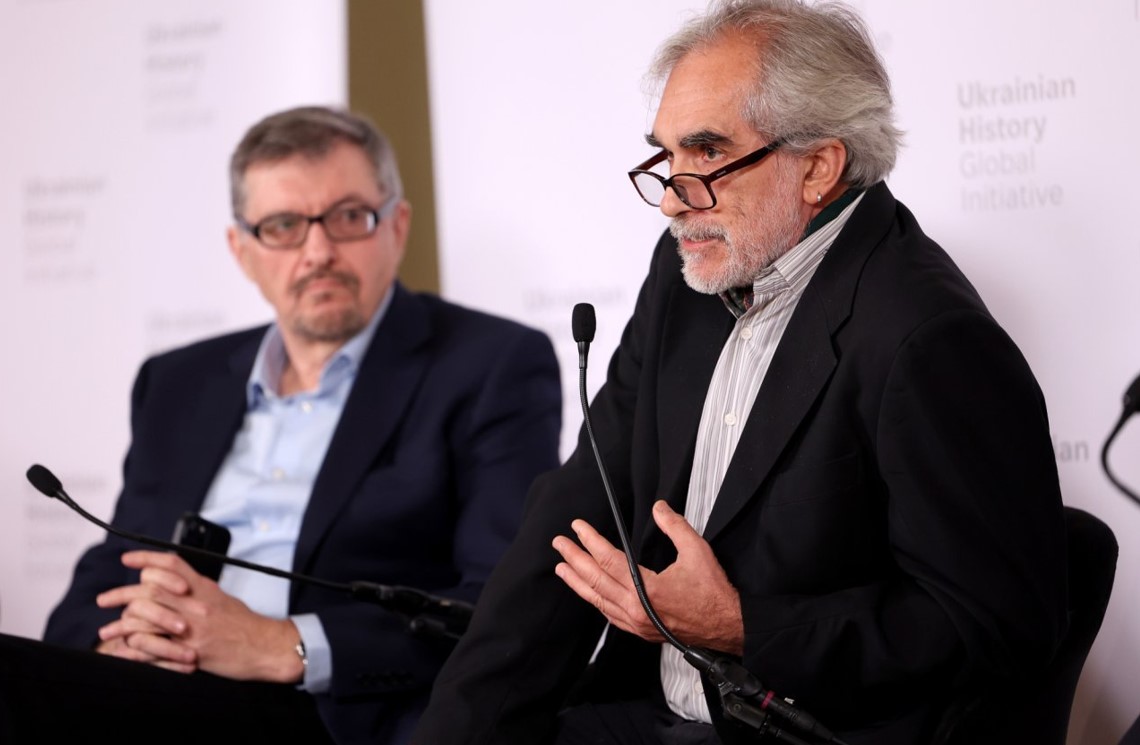
Грицак считает, что Пинчука больше интересует то, что украинские историки раньше по разным причинам игнорировали, чем современная история: «Это – попытка проникнуть в зону глубокой истории, которая использует ресурсы прошлого для лучшего понимания настоящего, а также для начертания возможных сценариев будущего. Это первая инициатива такого характера, думаю, не только в украинской, а даже в европейской истории».
Председатель Института национальной памяти Антон Дробович также исключает чье-то влияние на научные работы, кроме самих ученых. «Если вдруг что-нибудь такое произойдет, уверен, что большая часть академического совета просто выйдет из проекта, и он просто не произойдет. Ну как вы себе представляете: того же Снайдера кто-то может уговорить за деньги написать что-нибудь хорошее или плохое об истории Украины? Или Плохия или Грицак? – задает вопрос Дробович. – И вообще большая часть критики из социальных сетей раздается от людей, регулярно ходящих на «Ялтинскую европейскую стратегию», были в эфирах ICTV (телеканал, входящий в медиаимперию Виктора Пинчука – «Главком»)… Ну, не могу я серьезно воспринимать такую критику».
Дробович рассказывает, что присоединился к проекту по приглашению Снайдера и не контактировал с представителями из структур Пинчука: «Формированием состава советов занимались их руководители. Меня этот проект заинтересовал, я попросил прислать какие-то документы, мне предоставили список людей, которые уже согласились участвовать в нем. Уверен, что это пойдет на пользу Украине».
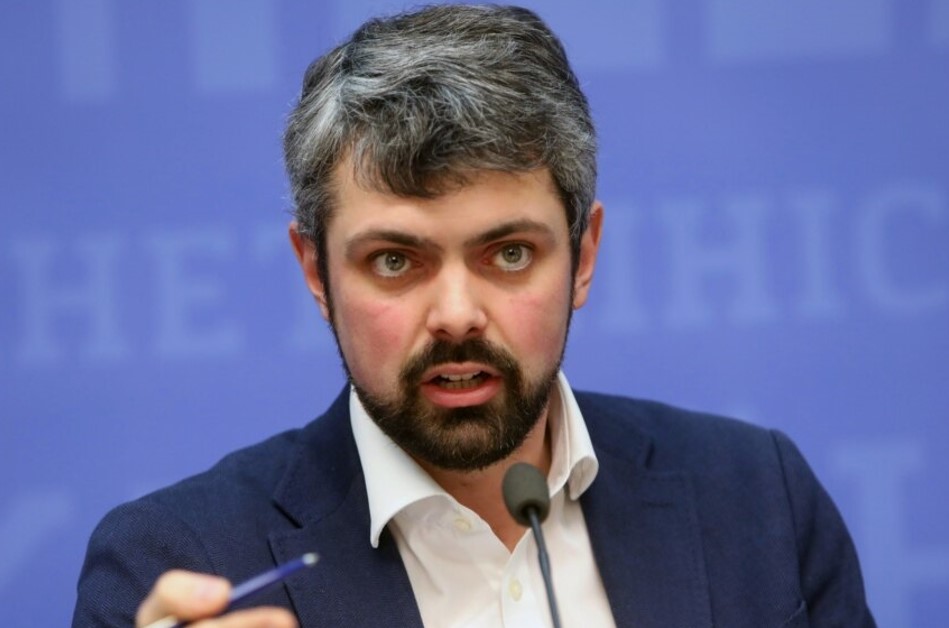
По словам директора Института национальной памяти, еще несколько месяцев будут комплектоваться академические группы по ученым и происходить распределение тем, а где-то с весны начнется работа по написанию разделов этого исследования. Каждый из членов советов будет закреплен к конкретной тематике (Вторая мировая война, казачество, княжеское время и др.). «Насколько мне объяснили, мы будем встречаться с учеными, обсуждать и обсуждать. Это будет происходить так же, как в ученых и академических советах в университетах, говорит Дробович. – В результате будет получено много отдельных работ, которые должны быть пронизаны общей логикой и общаться друг с другом. Это очень интересный проект, но сложный в управлении и организации. Вокруг того, чтобы обеспечить его целостность, думаю, и будут основные академические дискуссии».
По поводу оплаты своей работы участники советов пока не говорят ничего конкретного. «Не знаю ли мне самому предусмотрено какое-то жалованье, потому что я как содиректор академического совета не претендую на это, – говорит Грицак. – Но знаю, что авторы будут иметь гонорары за эту работу, потому что хорошая работа должна быть оплачена. Не представляю, какие это деньги, но предполагаю, что немалые». Дробович уверяет, что ему не обещали за участие «золотых гор», и если он будет самостоятельно писать какой-то текст, то обязательно как госслужащий вспомнит о гонораре в своей декларации.
Вопрос о конфликте интересов, когда исследование украинской истории будет финансировать персонаж этой же истории, прозвучал на презентации, и видно было, что олигарх Пинчук изрядно напрягся. Отдуваться пришлось снова Тимоти Снайдеру, разъяснившему, как много времени было потрачено на учреждение прозрачного благотворительного фонда по британским законам, и отметил, что одна из «капсул» исследования будет посвящена именно памятным 90-м годам и такому явлению как олигархи. Снайдер отметил, что на организацию работы сотни исследователей, в частности, зарубежных, уйдет немалая куча денег, но писать в своих статьях они будут то, что сочтут необходимым. Сам Пинчук заявил, что он – один из членов наблюдательного совета, и у него нет никакого влияния на то, кого набирают в научный совет. У основателя проекта была лишь идея пригласить к нему своего вдохновителя профессора Даймонда, но тот уже, к сожалению, «недостаточно молод».
Конечно, несмотря на весь неоднозначный бекграунд Украинской истории, хотелось бы, чтобы на выходе был получен продукт, который стал бы основой для изучения украинской истории в школах и институтах. А больше всего интригует, как будет выглядеть эта история через три года, когда в нынешние бурные времена она творится чуть ли не каждый день.


